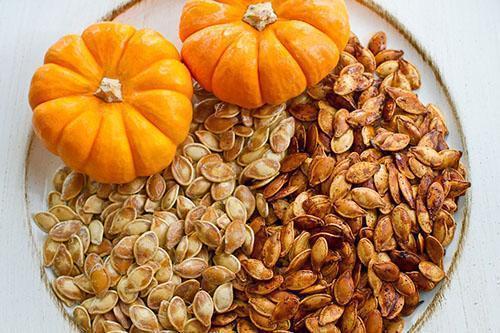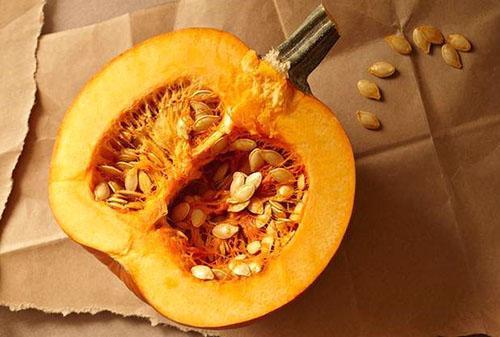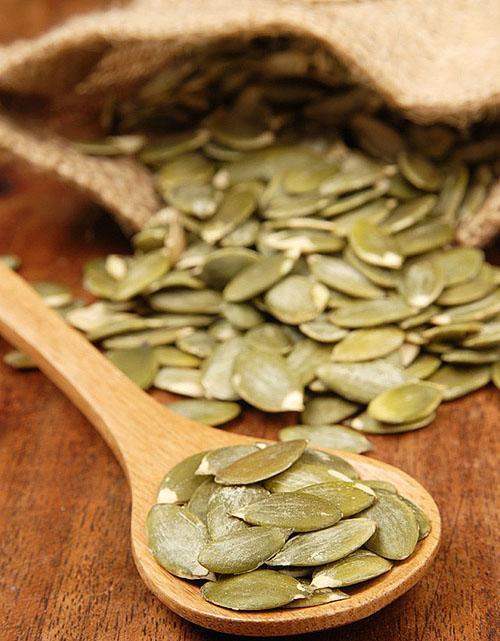The benefits and harms of eating pumpkin seeds
 When the foliage dries up and falls in the autumn garden, pumpkins among the beds look even brighter. Fruits with a rich orange pulp, as if having collected all the heat and sunlight over the summer, have a lot of useful qualities. Most often, dense sweet pulp is used for food, and the most valuable thing in pumpkin is that its seeds are considered pampering for a pleasant pastime or are completely thrown away.
When the foliage dries up and falls in the autumn garden, pumpkins among the beds look even brighter. Fruits with a rich orange pulp, as if having collected all the heat and sunlight over the summer, have a lot of useful qualities. Most often, dense sweet pulp is used for food, and the most valuable thing in pumpkin is that its seeds are considered pampering for a pleasant pastime or are completely thrown away.
But it is under the hard white shell that wealth is hidden that can bring invaluable benefits to the human body. So what are pumpkin seeds good for? And for what diseases can their use have a positive effect on health?
Pumpkin seeds composition

There are so many vitamins, organic acids and mineral salts under the white peel of green kernels that they can rightfully be called a storehouse of health, and the beneficial properties of pumpkin seeds are worthy of study and application in medicine.
100 grams of dry peeled seeds account for 45.8 grams of fat, 24.5 grams of protein, almost 20 grams of carbohydrates, 4 grams of dietary fiber, about 7 grams of moisture, as well as 8.6 grams of saturated fatty acids. At the same time, the calorie content of pumpkin seeds is 541 kcal per 100 grams.
The same small 100-gram handful of seeds contains more than two daily norms of tocopherol intake, a quarter of the norm of vitamin PP, as well as vitamins K and B1, B2 and B3, B6 and B9, biotin and beta-carotene, ascorbic acid and choline.
In addition, pumpkin seeds are also unique in terms of their mineral composition, which include: vanadium and manganese, copper and magnesium, zinc and silicon, chromium and iron, as well as cobalt, boron, potassium, iodine and many other compounds. At the same time, the concentration of many of these substances is so high that in 100 grams of pumpkin seeds they include several daily intake rates, for example, phosphorus, vanadium, magnesium and copper, phosphorus and zinc.
Doctors cannot fail to note the content of a large amount of valuable amino acids, which determine part of the beneficial properties of pumpkin seeds. Among the compounds irreplaceable for the body are valine and tryptophan, isoleucine and phenylalanine. Equally important is the presence of glycine and arginine in grains, as well as phytosterols, pectins and unsaturated fatty acids, which play a huge role in the prevention and treatment of atherosclerosis and other diseases.
The benefits and properties of pumpkin seeds
 Due to the rich vitamin and mineral composition, the unique combination of all active substances and their easily digestible form, pumpkin seeds are useful in the treatment of many diseases.
Due to the rich vitamin and mineral composition, the unique combination of all active substances and their easily digestible form, pumpkin seeds are useful in the treatment of many diseases.
Most often, pumpkin seeds are in demand in the fight:
- with dysfunctions in the genitourinary sphere;
- with atherosclerosis;
- with diseases of the heart and blood vessels;
- with problems of digestion and metabolic processes;
- with helminths parasitizing in the human body and harmful protozoa.
What are the benefits of pumpkin seeds for men and women? As you know, seeds are rich in zinc and phytosterols, which affect the sexual function of both sexes.
- Zinc is an indispensable element in the synthesis of testosterone in men, and is also necessary for maintaining the functions of the gonads.
- Phytosterols, on the other hand, actively reduce testosterone levels, which is beneficial for the female body. But it turns out that these compounds can also benefit men who suffer or are at risk of such a formidable disease as a prostate tumor.
For greater benefit in case of prostate dysfunction and suspected adenoma, it is better to use pumpkin seed oil preparations, which are better absorbed and more effective in this case.
 At the same time, eating peeled kernels is considered an effective folk remedy for helminths. If antiparasitic drugs of artificial nature, killing harmful organisms, have a depressing effect on the human body, then the seeds have no such side effect.
At the same time, eating peeled kernels is considered an effective folk remedy for helminths. If antiparasitic drugs of artificial nature, killing harmful organisms, have a depressing effect on the human body, then the seeds have no such side effect.
The active substance of pumpkin seeds, which has an immobilizing effect on worms, is called cucurbitin. This amino acid was first discovered in the fruits of pumpkin crops and in honor of the name of the species and received its name.
Raw pumpkin seeds are many times more effective against parasites than roasted or roasted kernels.
Once in the digestive tract, cucurbitin practically paralyzes flat and round worms, which, as a result, cannot attach to the intestinal wall for nutrition, lose their ability to reproduce and are removed from the body with feces.
As a remedy for worms, pumpkin seeds should be used:
- raw;
- dried without using elevated temperatures;
- in the form of an infusion, for which two tablespoons of crushed kernels are poured into 750 ml of water, the mixture is boiled and insisted for about 30 minutes.
For children, the seeds can be sweetened with honey, besides, such an additive only increases the beneficial properties of pumpkin seeds.
 Minerals, amino acids and vitamins in the composition of the purified nuclei have a beneficial effect on the work of the cardiovascular system, improving the functioning of both the heart itself and strengthening the walls of large and small vessels. Pumpkin seeds are a recognized natural remedy for atherosclerosis and its manifestations.
Minerals, amino acids and vitamins in the composition of the purified nuclei have a beneficial effect on the work of the cardiovascular system, improving the functioning of both the heart itself and strengthening the walls of large and small vessels. Pumpkin seeds are a recognized natural remedy for atherosclerosis and its manifestations.
The inclusion of green kernels and foods containing them in the diet allows you to cleanse the body of excess cholesterol and resist its accumulation.
Pumpkin seeds are useful for increased gas production, decreased peristalsis and constipation. This is a good diuretic and laxative that is gentle and has no side effects.
Due to the abundance of fiber, seeds are excellent for cleansing the digestive tract and can be recommended if necessary to lose weight. However, it is important to remember about the calorie content of pumpkin seeds and not overdo it with their intake.
Organic acids and vitamins present in pumpkin seeds are useful and are used to heal the skin, fight baldness and seborrhea.
The most effective for cosmetic purposes is pumpkin seed oil, as well as a mass of fresh milled kernels.
Harvesting pumpkin seeds and methods of their use
 Extracted pumpkin seeds:
Extracted pumpkin seeds:
- be sure to wash, freeing from wet fibers;
- then dry on a soft cotton towel or napkin;
- within a day they are dried on sheets of paper or pallets.
This gentle method will help preserve all the beneficial properties of pumpkin seeds.
The process can be simplified if drying is carried out in a special electric dryer oven or oven, keeping temperatures above 75 ° C. In this case, it can take no more than 20-30 minutes until it is fully ready.
Dry pumpkin seeds are scattered in tightly closed jars and stored in a dry, ventilated room, out of direct sunlight.
So that, with a lot of benefits, pumpkin seeds do not harm health, it is better to refuse fried kernels, and also not to store the product for too long, since the rich oils in the seeds can deteriorate and give the taste a clear bitterness.
 For culinary purposes, pumpkin seeds can be used:
For culinary purposes, pumpkin seeds can be used:
- to enrich the taste and useful properties of bakery products and dessert pastries;
- in salads with fresh or blanched vegetables;
- in cereals, thick hearty soups and other hot dishes;
- for decorating confectionery and cream products, cocktails.
- as an independent snack.
There are a lot of options for using healthy pumpkin seeds, the main thing is that their use brings only good results for well-being and health.
Contraindications to the use of pumpkin seeds
 And possible harm, and benefits of pumpkin seeds entirely depend on their composition and the literacy of using the product. In no case should you abuse enough high-calorie green kernels.
And possible harm, and benefits of pumpkin seeds entirely depend on their composition and the literacy of using the product. In no case should you abuse enough high-calorie green kernels.
Even with a minimum of contraindications, overeating a product rich in fats, proteins and other active substances does not have the best effect on well-being.
Particular control over portion size should be established when consuming seeds:
- young children;
- pregnant women;
- overweight people;
- patients suffering from exacerbation of gastric or intestinal ailments;
- patients who have been diagnosed with gout;
- in the presence of stones and sand in the kidneys, bladder and ureters.
Since there are practically no allergic reactions to pumpkin seeds, this product can successfully replace peanuts, almonds and hazelnuts.